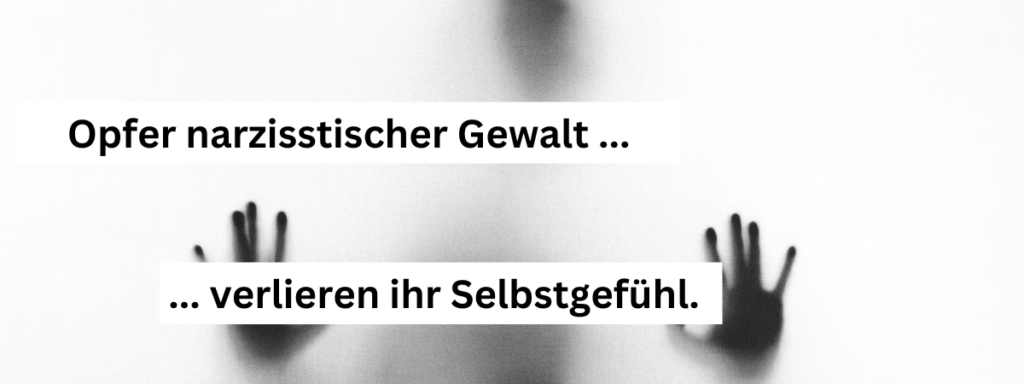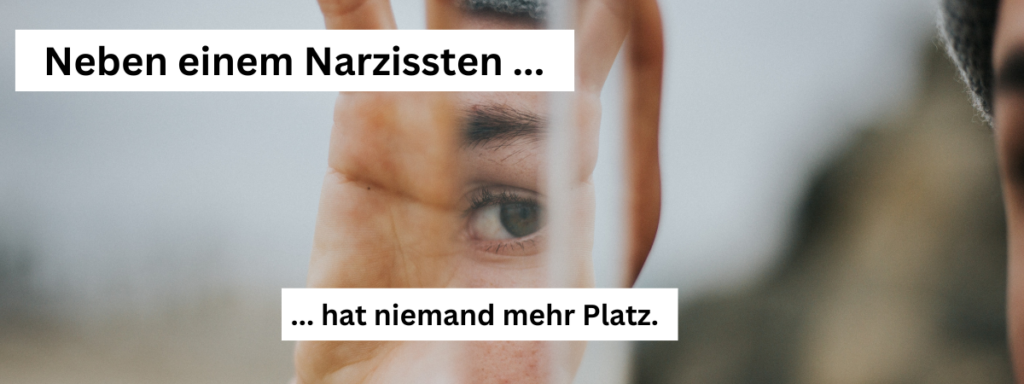
Am I allowed to think like that? Am I allowed to behave that way? What if I’m just imagining everything? That – or something like it – is how the carousel of thoughts goes round for victims of narcissistic abuse, as their feelings of self-worth recede, friends become fewer, and the dark days increase. Narcissistic abuse often goes unnoticed, because of its gradual nature. And by the time the victim does wake up, the damage has already been done. This week, a report on narcissistic abuse in relationships, and the help available to those affected.
NARCISSISTIC ABUSE – WHAT IS IT?
In a loving relationship, in the parental home, at work: narcissistic abuse can emerge in any type of relationship. While the term originally tended to describe a form of emotional violence by “I-centred” parents towards their children, today narcissistic abuse usually describes violence between life partners. In the media, we also frequently hear of so-called toxic relationships in this context.
NARCISSISTIC VIOLENCE DURING CHILDHOOD
The term “narcissistic abuse”, sometimes referred to as “narcissistic violence”, dates back to the 1960s, where it is particularly prevalent in the work of Polish-Swiss psychologist Alice Miller. While researching her book Parent-Child-Relationship, Miller concerned herself intensively with early childhood development and the consequences of an exaggerated sense of entitlement on the part of the parents.

In “The Drama of the Gifted Child” (Suhrkamp, 1979), Miller describes the (conscious or unconscious) transfer of the parents’ desires and emotions onto the child as a special form of emotional violence. The child is prevented from developing its own “feeling of self”, resulting in is a life-long “feeling of smallness”.
Children of narcissistic parents often lend greater weight to the expectations of others than they do their own feelings. This means they find it difficult to define boundaries, and frequently do not notice if someone oversteps those limits, and/or a situation goes beyond their control.
This can also become a problem in other relationships: experiencing narcissistic violence as a child makes many of those affected blind to the notorious “red flags” by which experts recognise narcissistic and/or otherwise toxic relationships.
HOW CAN WE RECOGNISE NARCISSISTIC ABUSE?
Something many people don’t know is that a relationship can include narcissistic abuse WITHOUT the need for a diagnosis of Narcissistic Personality Disorder (NPD).
Looked at from another angle, it is also possible to be in a relationship with a diagnosed narcissist and not to experience any emotional violence. Whether or not it involves narcissistic violence, therefore, depends not on a diagnosis of any kind, but on the daily routine of the relationship and the consequences for the victim.
Narcissistic abuse is generally distinguished by the fact that it is not obvious. Since emotional violence is not associated with physical violence in most cases, friends and family often only learn of the toxic dynamics with hindsight. Victims of narcissistic violence…
- Often increasingly withdraw from people in their immediate environment;
- Can give the impression of being tired, demoralised and exhausted;
- Don’t usually make an issue of their relationship, or any relationship problems;
- Tend to defend their partner;
- Seek to place the blame for problems in the relationship on themselves above all.
For the victim, the transformation from “perfect” partner to narcissist normally takes place suddenly and unexpectedly, as weeks or months of cosy togetherness and dreams of a future together are followed by that love being withdrawn. The partner gives the impression of being cold and standoffish, can become verbally abusive, and falls back on techniques of emotional blackmail.
In this blog article, couples’ therapist Eric Hegmann offers a very good overview of the 8 Stages in the Course of a Relationship with a narcissist.
WHAT HIDDEN NARCISSISM DOES WITH VICTIMS
Narcissistic people believe the world owes them something. They expect to be constantly praised, admired and loved. As a result, they cannot bear it if their partner doesn’t give them their completely undivided attention.
The problem is that the exaggeration of one partner in the relationship leads to the disparagement of the other. The narcissist’s need for self-aggrandisement “forces” them to belittle their partner. Remarks such as “You’re exaggerating yet again!” or “Now it’s getting really silly!” disparage the emotions of the partner, devaluing those they are aimed at.
Narcissistic abuse has particularly dramatic consequences because it takes place in a concealed way: a narcissist will not “out” themselves as being that on Tinder. At the beginning, the little digs that destroy victims’ feelings of self-worth are exactly that: little digs. No reason to start a fight.
LONG-TERM CONSEQUENCES OF NARCISSISTIC VIOLENCE

As time passes, the victim “swallows” more and more, and feels the way in which the relationship is becoming increasingly troubling. Instead of blaming their partner, however, they blame themselves: “I just need to make more of an effort,” or “I’m probably really difficult” are typical thoughts of victims of narcissistic violence. The long-term consequences of abusive relationships can include:
- Psychological after-effects such as depression, anxiety disorders and panic attacks;
- Physical consequences such as migraines, stomach ulcers, digestive problems and many others;
- Sleeping disorders all the way through to insomnia;
- Burn-out due to emotional overload and constantly increased stress levels.
As well as this, experts believe there is a connection between experiencing narcissistic abuse and so-called Impostor Syndrome. People with Impostor Syndrome suffer from permanent angst, do not believe they are good enough in the eyes of others (more information…)
LOVE BOMBING AND GASLIGHTING
Partners of narcissists often believe, especially at the beginning of the relationship, that they have had a real stroke of luck. Their “better” half:
- Seems to know them better than any partners they have had in the past;
- Has the same dreams, wishes and ambitions as themselves;
- Can read their every desire in their eyes.
They feel understood and secure. The sex is often amazing, and they are in seventh heaven. Experts refer to this phase in the narcissistic relationship as “Love Bombing“: The victim can do no wrong, seemingly. and is placed on a pedestal by the narcissist. This is one of many manipulative techniques that can play a role in narcissistic abuse. Love Bombing is followed by the fall from the pedestal:
GASLIGHTING KEEPS VICTIM IN THE RELATIONSHIP
If the partner behaves in a way that the narcissist does not like or restricts their control, they begin what is known as “gaslighting”: The partner will have their words twisted in their mouth, as the seeds of doubt in their perception begin to be sown.
Comments such as “You’ve remembered that wrong!” or “Are you sure that happened that way?” feed self-doubt and at some point lead to the victim no longer trusting their own feelings. In this way, the narcissist makes the partner emotionally dependent on them, giving the victim what they so urgently crave: confirmation, praise. A plaster for their wounded feeling of self-worth. And the victim will do absolutely anything not to lose this supposed safety.
EMOTIONAL DEPENDENCY ON THE NARCISSIST
The really shocking thing about narcissistically abusive relationships is the fact that their victims often fear separation from the relationship more than do continuing it. This is a result of the emotional dependency developed by most victims. ‟I can’t live without them!” is a belief shared by many of those affected.
The only solution is ice-cold withdrawal. After splitting up, many people with strongly narcissistic tendencies try to win back their partner, and the Love Bombing starts all over again. Due to their emotional dependency, many victims don’t manage to break free of the narcissist entirely. If the narcissist doesn’t manage to win back the partner, then it gets nasty: Wars of the Roses between narcissist are far from rare.
RECOVERING FROM A NARCISSISTIC RELATIONSHIP
Victims of narcissistic violence have a long road to recovery ahead of them. Many of those affected are still suffering the symptoms of post-traumatic stress disorder (PTSD) years later, and have difficult entering into or maintaining relationships of any kind. This is because narcissistic abuse destroys something which every one of us normally has within us: the belief that others mean well towards them.
Socially, while narcissistic abuse and its consequences may still not be afforded the attention it deserves, a wide range of self-help groups for victims of the condition have emerged in recent years. These include:
- Self-help group of the association Narzissmus und Partnerschaft (in Vienna): https://www.em-life-forum.de/selbsthilfegruppen/selbsthilfegruppe-wien.html
- Netzwerk EDEN for victims of narcissistic abuse (self-help group founded by psychotherapist Katharina Schuldner): https://www.facebook.com/narzissmus.at
- Paracelsus Recovery (treatment centre for narcissistic abuse in Switzerland): https://www.paracelsus-recovery.com/de/behandlung-narzisstischen-missbrauchs/
Support:
Become a narcissism expert with Pascal Dricot! Are you looking for a place to get in-depth knowledge about narcissism and toxic behavior? The platform offers you: A comprehensive understanding of narcissism and its different types. Strategies to recognize toxic behavior and effectively protect yourself against it. An ever-growing knowledge database. Lifetime access to valuable content. Expert knowledge from Pascal Dricot, a professional life and social consultant with over 22 years of business experience. Join us and learn to recognize, understand and respond effectively to toxic behavior. Secure your exclusive access now!
Discount code for our readers: HOPEFORTHEFUTURE50
https://www.empower.pascal-dricot.com/?aff=Andrea
Translation by Tim Martinz-Lywood, European Exchange Ltd.
www.european-exchange.co.uk
#againsthumantrafficking #gegenmenschenhandel #endexploitation #endtrafficking #hopeforthefuture #österreich
